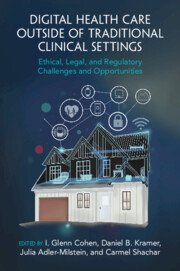131 results
Contents
-
- Book:
- Digital Health Care outside of Traditional Clinical Settings
- Published online:
- 25 April 2024
- Print publication:
- 02 May 2024, pp vii-x
-
- Chapter
-
- You have access
- Open access
- HTML
- Export citation
Introduction
-
-
- Book:
- Digital Health Care outside of Traditional Clinical Settings
- Published online:
- 25 April 2024
- Print publication:
- 02 May 2024, pp 1-10
-
- Chapter
-
- You have access
- Open access
- HTML
- Export citation
Acknowledgments
-
- Book:
- Digital Health Care outside of Traditional Clinical Settings
- Published online:
- 25 April 2024
- Print publication:
- 02 May 2024, pp xvii-xviii
-
- Chapter
-
- You have access
- Open access
- HTML
- Export citation
Contributors
-
- Book:
- Digital Health Care outside of Traditional Clinical Settings
- Published online:
- 25 April 2024
- Print publication:
- 02 May 2024, pp xv-xvi
-
- Chapter
-
- You have access
- Open access
- HTML
- Export citation
Copyright page
-
- Book:
- Digital Health Care outside of Traditional Clinical Settings
- Published online:
- 25 April 2024
- Print publication:
- 02 May 2024, pp iv-iv
-
- Chapter
-
- You have access
- Open access
- HTML
- Export citation
Dedication
-
- Book:
- Digital Health Care outside of Traditional Clinical Settings
- Published online:
- 25 April 2024
- Print publication:
- 02 May 2024, pp v-vi
-
- Chapter
-
- You have access
- Open access
- HTML
- Export citation
Part III - The Shape of the Elephant for Digital Home Diagnostics
-
-
- Book:
- Digital Health Care outside of Traditional Clinical Settings
- Published online:
- 25 April 2024
- Print publication:
- 02 May 2024, pp 105-168
-
- Chapter
-
- You have access
- Open access
- HTML
- Export citation
Tables
-
- Book:
- Digital Health Care outside of Traditional Clinical Settings
- Published online:
- 25 April 2024
- Print publication:
- 02 May 2024, pp xiii-xiv
-
- Chapter
-
- You have access
- Open access
- HTML
- Export citation
Figures
-
- Book:
- Digital Health Care outside of Traditional Clinical Settings
- Published online:
- 25 April 2024
- Print publication:
- 02 May 2024, pp xi-xii
-
- Chapter
-
- You have access
- Open access
- HTML
- Export citation

Digital Health Care outside of Traditional Clinical Settings
- Ethical, Legal, and Regulatory Challenges and Opportunities
-
- Published online:
- 25 April 2024
- Print publication:
- 02 May 2024
-
- Book
-
- You have access
- Open access
- Export citation
Introduction
- from Part IV - Innovation During COVID-19
-
-
- Book:
- COVID-19 and the Law
- Published online:
- 27 October 2023
- Print publication:
- 09 November 2023, pp 221-224
-
- Chapter
-
- You have access
- Open access
- HTML
- Export citation
Part IV - Innovation During COVID-19
-
- Book:
- COVID-19 and the Law
- Published online:
- 27 October 2023
- Print publication:
- 09 November 2023, pp 219-264
-
- Chapter
-
- You have access
- Open access
- HTML
- Export citation
Part I - The Health Care System That COVID-19 Encountered
-
- Book:
- COVID-19 and the Law
- Published online:
- 27 October 2023
- Print publication:
- 09 November 2023, pp 11-86
-
- Chapter
-
- You have access
- Open access
- HTML
- Export citation
Part V - Opening New Pathways for Health Care Delivery and Access
-
- Book:
- COVID-19 and the Law
- Published online:
- 27 October 2023
- Print publication:
- 09 November 2023, pp 265-328
-
- Chapter
-
- You have access
- Open access
- HTML
- Export citation
Part VI - Global Responses to COVID-19
-
- Book:
- COVID-19 and the Law
- Published online:
- 27 October 2023
- Print publication:
- 09 November 2023, pp 329-390
-
- Chapter
-
- You have access
- Open access
- HTML
- Export citation
Copyright page
-
- Book:
- COVID-19 and the Law
- Published online:
- 27 October 2023
- Print publication:
- 09 November 2023, pp iv-iv
-
- Chapter
-
- You have access
- Open access
- HTML
- Export citation
Contributors
-
- Book:
- COVID-19 and the Law
- Published online:
- 27 October 2023
- Print publication:
- 09 November 2023, pp xv-xviii
-
- Chapter
-
- You have access
- Open access
- HTML
- Export citation
Part II - COVID-19, Disparities, and Vulnerable Populations
-
- Book:
- COVID-19 and the Law
- Published online:
- 27 October 2023
- Print publication:
- 09 November 2023, pp 87-140
-
- Chapter
-
- You have access
- Open access
- HTML
- Export citation
25 - Vaccine Tourism, Federalism, Nationalism
- from Part VI - Global Responses to COVID-19
-
-
- Book:
- COVID-19 and the Law
- Published online:
- 27 October 2023
- Print publication:
- 09 November 2023, pp 379-390
-
- Chapter
-
- You have access
- Open access
- HTML
- Export citation
Dedication
-
- Book:
- COVID-19 and the Law
- Published online:
- 27 October 2023
- Print publication:
- 09 November 2023, pp v-vi
-
- Chapter
-
- You have access
- Open access
- HTML
- Export citation



